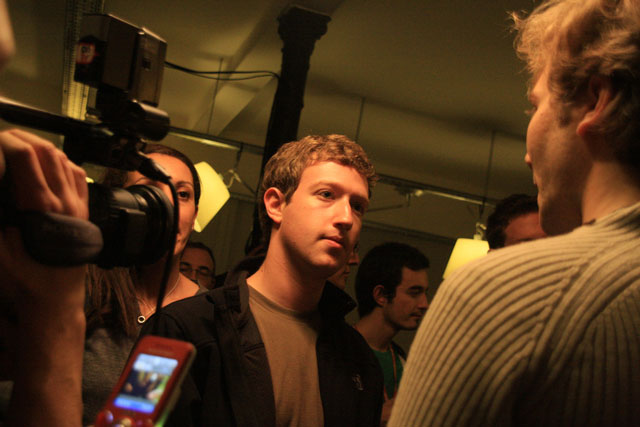 The rich are getting richer and the poor are getting poorer. It’s the phrase that’s launched a thousand editorials, most of them decrying the manifest evils of the insatiable 1%. But a large part of this increased inequality is driven not by greed or manipulation, but by technology. And it’s only going to get worse.
The rich are getting richer and the poor are getting poorer. It’s the phrase that’s launched a thousand editorials, most of them decrying the manifest evils of the insatiable 1%. But a large part of this increased inequality is driven not by greed or manipulation, but by technology. And it’s only going to get worse.
Take a look at the the youngest billionaires of 2013: twenty-nine people under the age of 40 who are all worth more than US$1bn. Ten of them — more than a third — made their fortunes in technology. The two youngest — Facebook founders Dustin Moskovitz and Mark Zuckerberg — are both under 30.
If we exclude the 12 youngsters who inherited their wealth, we find that 60% of self-made billionaires earned their money in technology. Only seven earned their status via more traditional wealth sources like finance or energy. What’s more, the technology magnates are, on average, four times wealthier.
And this doesn’t apply only to billionaires. The vast majority of well paid jobs created in the past two decades have revolved in one way or another around technology. Real wages for more traditional work — particularly in manufacturing, administrative and clerical jobs — have been either flat or falling since the 1970s.
The Economist argues that the persistent level of unemployment in the developed world is largely due to a fundamental shift in the world’s economy — a shift being driven by technology. Machines are not just getting better at thinking (software), they are getting better at doing (robotics).
This shift has exposed once safe jobs — accounting, technical writing, skilled manufacturing, real estate — to the perils of automation. Those fortunate enough to have skills complementary to this new wave — computer programmers, robotics experts, interface designers, data scientists — are reaping disproportionate benefits. As William Gibson said, the future is already here — it’s just not evenly distributed.
This is because technology is, at its heart, an evolutionary advantage. Its ability to augment our limited human capabilities has allowed us to dominate this planet (often to its detriment). Throughout human history, those able to master new technologies quickly have reaped the benefits. The first farmers to invent the plough could feed much larger families and thus came to dominate their communities and then the planet.
But this advantage is always temporary. Better, cheaper and faster technologies arrive and displace the old ones. What has changed is how quickly this happens. The two centuries from 1750 to 1950 produced more technological advancements than the entire millennium before that.
The past four decades have seen us triple even that incredible progress in one fifth of the time.
And while technology changes ever more quickly, society does not. Most human beings favour comfort, stability and certainty. This means that the politicians who serve them try to avoid nasty surprises and unpleasant medicine whenever possible. And there’s nothing more unpleasant than being told your hard-won skills are not useful or valuable anymore.
But these hard truths need to be accepted before solutions can be sought. Too much of our energy is spent debating about how to appropriately punish the rich for their good fortune, and how to return “decent jobs” to the masses (by force if necessary). Not nearly enough is spent on preparing ourselves and our children for this new technological reality.
One area crying out for attention is education — and not just in South Africa’s particularly dysfunctional case. Around the world, the vast majority of primary and secondary education is grounded in a dead paradigm. Most schools still focus on rote and process learning, favouring consensus and uniformity over free thought and dissent. This produces obedient clerks and machine shop workers — not creative technology entrepreneurs.
Another area in which governments could make a huge positive impact is to embrace technology rather than resisting it. Organised labour will fight tooth and nail to protect industries that have reached the end of their natural lives, but that will not stop their demise. Rather than pander to the current crop of workers we should find ways — tax incentives, smarter regulations, infrastructure — to plant the seeds for the next one.

Regardless of whether we choose to act, this wave will sweep over us. The technology revolution is only just getting into its stride. Like the industrial revolution before it, it will cause untold misery for the people displaced by its relentless and implacable reality.
We are looking for cartoon villains to blame but this has more to do with biology than justice. Technologists aren’t better or more deserving people, they’re just better adapted to the current (and future) reality. Most animals go extinct not because of hunting, but because their habitat has disappeared.
But all is not lost. The second half of the industrial revolution was marked by huge increases in the average wages of workers, and the rise of the middle class majority that now dominates the developed world. What changed? Better education — surprise, surprise — led the charge.
We need not repeat the mistakes that made Dickensian England so unbearably grim and cruel. But we need to ignore the armchair activists calling for another Marxist revolution and focus instead on finding solutions. — (c) 2014 Mail & Guardian
- Alistair Fairweather is chief technology officer at the Mail & Guardian
- Visit the Mail & Guardian Online, the smart news source

